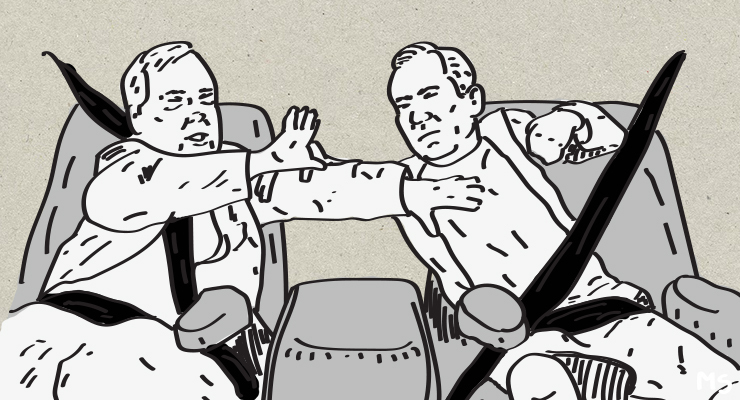
While we wait for the Homeric epic of the Ben Roberts-Smith “defamation trial of the century” to produce its denouement, some light entertainment arrives in the form of the Federal Court’s decision to throw out the stupidest defamation case since Dutton v Bazzi: the Clive Palmer and Mark McGowan show.
Justice Michael Lee, following a fine tradition of judges waxing lyrical to entice interest in his succeeding 526 pages of legal reasoning, made plain from the outset where he was heading:
Enoch Powell once remarked: ‘For a politician to complain about the press, is like a ship’s captain complaining about the sea.’ As these proceedings demonstrate, a politician litigating about the barbs of a political adversary might be considered a similarly futile exercise.
Props for quoting a fascist! Not that Powell was wrong but, you know, Goebbels said a lot of clever things too.
Anyway — Palmer and McGowan, it is well known, hate each other’s guts, for reasons that have little to do with the public interest and much to do with their shared conviction of their own importance.
During 2020, the egos were battling out a very public spat — reported obsessively in Western Australia and sparingly everywhere else — over two points of disagreement. One was WA’s tough border closure regime, which Palmer unsuccessfully challenged in the High Court; the other was an extraordinary piece of legislation passed by McGowan’s government that was intended to, and did, take away from Palmer’s corporate interests the benefit of arbitration decisions (in relation to mining tenements), which would have delivered them a financial windfall worth potentially billions of dollars. With a stroke of the legislative pen, McGowan had rubbed all that out.
In the public square, neither man held back. McGowan called Palmer an enemy of Australia; Palmer labelled McGowan a liar, corrupt and a criminal. All very defamatory, as the judge inevitably found.
Turning to the personalities before him, Lee was impressed by Palmer in the literal sense of that word: “Mr Palmer is an indefatigable litigant … His confidence and self-assuredness was evident.” However, “he was generally a combative and evasive witness … In one important respect, he gave fantastic evidence.” That was on Palmer’s professed belief that the special law McGowan had passed would, and was intended to, allow McGowan to have him (Palmer) killed with impunity. The judge thought this was fantastic, albeit disappointingly only in the literal sense of that word.
Ultimately, his honour decided it wasn’t “safe to place any significant reliance upon Palmer’s evidence. McGowan, by contrast, “was generally an impressive witness, but sometimes when he was pressed … he did exhibit what might be described as the muscle memory of a questioned politician in being non-responsive”. Still, overall, he was “generally candid”.
Lee then turned to each party’s defences. McGowan had run with qualified privilege, but failed comprehensively since his behaviour had not been reasonable (although, possibly surprisingly, Lee didn’t think he’d acted with malice towards Palmer). It’s a very technical defence that rarely succeeds, and pretty much never when you’re using a megaphone as McGowan had done.
For his part, Palmer bravely pleaded a defence of truth, requiring him to prove that McGowan was in fact a lying, conniving criminal. That went as well as you’d expect.
He also tried on a relatively exotic defence, a form of qualified privilege called “reply to attack”. Basically, it allows a degree of latitude in defaming someone if you’re only doing it because they assaulted you first. It’s a bit analogous to self-defence in the context of murder. For Palmer, it was a non-starter. The only good news for him, too, was the judge didn’t think he was being malicious either.
Everyone’s defences having failed, Palmer and McGowan were found to have indefensibly defamed each other. Lee awarded damages of $20,000 to McGowan, and $5000 to Palmer, a carefully calculated insult.
As Lee said in paragraph 522, “the game has not been worth the candle” (not from a fascist, this time thankfully, but the 16th-century French philosopher Michel de Montaigne).
Underlining how deeply unimpressed he had been left, Lee kicked everyone out of his courtroom with a stinging judicial rebuke:
At a time when public resources devoted to courts are under strain, and judicial resources are stretched, one might think that only a significant interference or attack causing real reputational damage and significant hurt to feelings should be subject of an action for defamation by a political figure.
He’s right, of course. This was a ridiculous waste of everyone’s time. McGowan can at least console himself that he didn’t sue first, and that he got the bigger verdict. Palmer is a persistent menace, clogging the courts with litigation that should have him and his interests verging on being declared vexatious and locked out altogether. He demonstrates as much genuine care for the justice system as he does for our democracy.
Neither man is likely to agree with the judge’s rulings or his reflections on their conduct, but an important reminder has been delivered nonetheless: litigation is for mugs.
Should Justice Lee have been even more caustic? Let us know your thoughts by writing to letters@crikey.com.au. Please include your full name to be considered for publication. We reserve the right to edit for length and clarity.








Crikey is committed to hosting lively discussions. Help us keep the conversation useful, interesting and welcoming. We aim to publish comments quickly in the interest of promoting robust conversation, but we’re a small team and we deploy filters to protect against legal risk. Occasionally your comment may be held up while we review, but we’re working as fast as we can to keep the conversation rolling.
The Crikey comment section is members-only content. Please subscribe to leave a comment.
The Crikey comment section is members-only content. Please login to leave a comment.